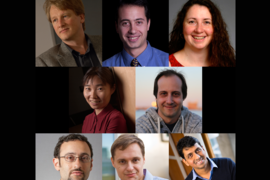Vinod Vaikuntanathan, an associate professor in the Department of Electrical Engineering and Computer Science (EECS), has been recognized for excellence with the 2017-2018 Harold E. Edgerton Faculty Achievement Award.
The honor lauds Vaikuntanathan, who also a principal investigator in the Computer Science and Artificial Intelligence Laboratory (CSAIL), for "his innovative and broadly-applicable work in cybersecurity, and for his wonderfully conversational and comprehensible lectures and inspiring discussions,” the award selection committee stated in its decision. The award was announced at a recent MIT faculty meeting.
The annual award was established in 1982 as a tribute to Institute Professor Emeritus Harold E. Edgerton, for his active support of junior faculty members. Each year, a committee presents the award to one or more non-tenured faculty members to recognize exceptional contributions in research, teaching, and service.
Vaikuntanathan’s colleagues and students have commended him for his clear, approachable, and engaging style as a teacher and mentor, as well as for his contributions to the EECS cryptography community and curriculum. The School of Engineering also recognized his contributions in these areas with the Ruth and Joel Spira Award for Distinguished Teaching in 2016.
“Vinod is widely considered the best cryptographer of his generation,” one senior faculty colleague wrote in a nomination. “His teaching record is stunning; it is very rare for a junior faculty member to be considered one of the best lecturers in our department. His citizenship is exemplary and he has taken on a leadership role in the EECS and CSAIL communities.”
Vaikuntanathan studies encryption systems that protect the privacy of data, digital signatures that protect its integrity, and cryptographic protocols that allow organizations that don’t trust each other to collaborate and perform meaningful tasks while maintaining individual privacy. One example is fully homomorphic encryption (FHE), which enables encrypted computation without having to trust a cloud provider with sensitive data. The data are encrypted using a key that is known only to the user, but uses an FHE algorithm to perform computations on the encrypted data. Even if attackers managed to subvert the cloud, they get nothing of value as long as users keep their keys secret.
The selection committee noted that the state of the art in FHE is now based on methods that Vaikuntanathan invented, which are many orders of magnitude more efficient than previous techniques. His work has made major steps towards widespread adoption of FHE, while at the same time producing beautiful theoretical results.
Vaikuntanathan is globally sought out for lectures, tutorials, and participation in international conferences and workshops on cryptography and complexity theory. As of last year, he had given 60 invited presentations in 17 countries across four continents. He has also co-authored more 80 publications in proceedings of refereed conferences and journals. He holds five patents.
His additional career honors include an Alfred P. Sloan Research Fellowship and a National Science Foundation CAREER Award, among others.
Vaikuntanathan received a bachelor of technology degree from the Indian Institute of Technology Madras, and MS and PhD degrees in computer science from MIT. He was the Josef Raviv Postdoctoral Fellow at IBM’s Thomas J. Watson Research Center and a researcher at Microsoft Research Redmond. He served as assistant professor at the University of Toronto for two years before returning to MIT as an assistant professor of EECS in 2013, attaining the rank of associate professor in July 2015. He is also a co-founder and the chief cryptographer at Duality Technologies.
Among other EECS activities, Vaikuntanathan co-directs Masterworks, the annual EECS celebration of thesis research leading to the MS and MEng degrees. This year’s event, which is free and open to the public, will be held on April 26 from 5-6:30 p.m. on the Charles M. Vest Student Street on the first floor of the Stata Center.










